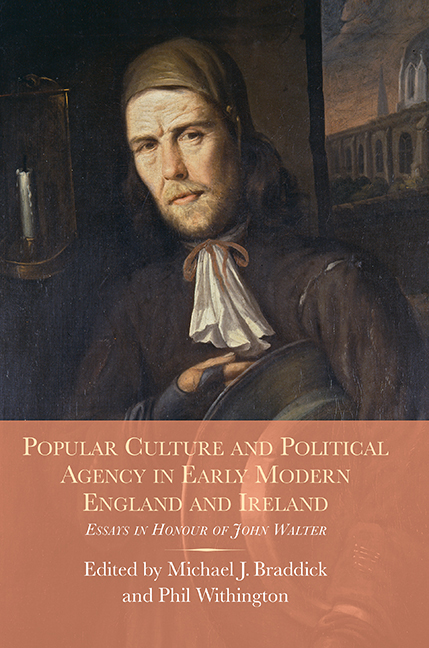 Popular Culture and Political Agency in Early Modern England and Ireland
Popular Culture and Political Agency in Early Modern England and Ireland Book contents
- Frontmatter
- Contents
- List of Illustrations
- List of Contributors
- Acknowledgements
- List of Abbreviations
- Introduction
- 1 John Walter and the social history of early modern England
- 2 Contrasting susceptibility to famine in early fourteenth- and late sixteenth-century England: the significance of late medieval rural social structural and village governmental changes
- 3 The politics of English political economy in the 1620s
- 4 Provision, household management and the moral authority of wives and mothers in early modern England
- 5 Popular senses of past time: dating events in the North Country, 1615–1631
- 6 Spectral lordship, popular memory and the boggart of Towneley Hall
- 7 Self-image and public image in the career of a Jacobean magistrate: Sir John Newdigate in the Court of Star Chamber
- 8 Gender, agency and religious change in early Stuart England
- 9 ‘A Standard which can never fail us’: the Golden Rule and the construction of a public transcript in early modern England
- 10 Religion, anti-popery and corruption
- 11 An ‘Aristotelian moment’: democracy in early modern England
- 12 John Lilburne and political agency in revolutionary England
- 13 An Irish Protestation? Oaths and the Confederation of Kilkenny
- 14 ‘Whereat his wife tooke great greef & died’: dying of sorrow and killing in anger in seventeenth-century Ireland
- Bibliography for John Walter
- Index
- Tabula Gratulatoria
- Miscellaneous Endmatter
4 - Provision, household management and the moral authority of wives and mothers in early modern England
Published online by Cambridge University Press: 09 May 2017
- Frontmatter
- Contents
- List of Illustrations
- List of Contributors
- Acknowledgements
- List of Abbreviations
- Introduction
- 1 John Walter and the social history of early modern England
- 2 Contrasting susceptibility to famine in early fourteenth- and late sixteenth-century England: the significance of late medieval rural social structural and village governmental changes
- 3 The politics of English political economy in the 1620s
- 4 Provision, household management and the moral authority of wives and mothers in early modern England
- 5 Popular senses of past time: dating events in the North Country, 1615–1631
- 6 Spectral lordship, popular memory and the boggart of Towneley Hall
- 7 Self-image and public image in the career of a Jacobean magistrate: Sir John Newdigate in the Court of Star Chamber
- 8 Gender, agency and religious change in early Stuart England
- 9 ‘A Standard which can never fail us’: the Golden Rule and the construction of a public transcript in early modern England
- 10 Religion, anti-popery and corruption
- 11 An ‘Aristotelian moment’: democracy in early modern England
- 12 John Lilburne and political agency in revolutionary England
- 13 An Irish Protestation? Oaths and the Confederation of Kilkenny
- 14 ‘Whereat his wife tooke great greef & died’: dying of sorrow and killing in anger in seventeenth-century Ireland
- Bibliography for John Walter
- Index
- Tabula Gratulatoria
- Miscellaneous Endmatter
Summary
The challenges of finding access to popular political culture have been amply demonstrated and ably met by John Walter's scholarship, not least in his analysis of the records of riot which, he argues, allow ‘subordinate groups, rendered otherwise silent by the inequalities of literacy and preservation of the historical record, to testify to their attitudes and beliefs’. One noteworthy feature of such records is the inclusion of the actions and voices of female participants who played prominent roles in varied forms of popular protest, and most especially in food riots. Women's moral authority in demanding just treatment in the market in times of scarcity has yielded glimpses of female leadership such as Ann Carter's exclamation – as ‘Captain’ of a contingent of rioters in Maldon in Essex in 1629 – that ‘I will be your leader for we will not starve.’ Accounting for the more general presence of women in the crowd that gathered at Maldon to prevent grain shipments, Walter ascribed their motivations to two factors. First was the ‘special licence’ they derived from a gendered division of labour which designated women as ‘provisioners of their families’. Second was the ‘licence afforded them by their ambivalent legal status’, which may have rendered them less vulnerable to formal prosecution. These explanations have proved foundational to approaches to women's direct participation in the politics of subsistence, although historians have disagreed over the wider significance of such examples of female political agency.
On the one hand, the ascription of women 's roles in popular protest to starkly gendered divisions of labour as well as to women 's imprecise legal status has become commonplace. In the English context, the emphasis on women 's domestic responsibilities for purchasing food originated in E. P. Thompson 's attribution of women 's participation in riots both to their involvement in ‘faceto- face marketing ’ which made them most acutely aware of price fluctuations and trading abuses, and to ‘the calculation that they had slightly greater immunity than the men from the retaliation of the authorities ’. In his exploration of the Wealden riots associated with disruption to the cloth trade, Peter Clark similarly ascribed the role of women to their ‘greater immunity from the law than men’ and ‘a special immunity for women who were unable to fulfil their familial role of feeding their household because of food shortage’.
- Type
- Chapter
- Information
- Popular Culture and Political Agency in Early Modern England and IrelandEssays in Honour of John Walter, pp. 73 - 90Publisher: Boydell & BrewerPrint publication year: 2017
